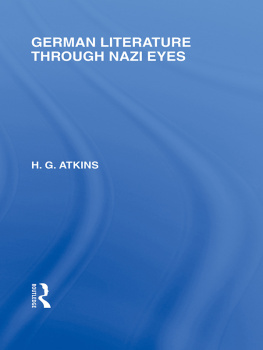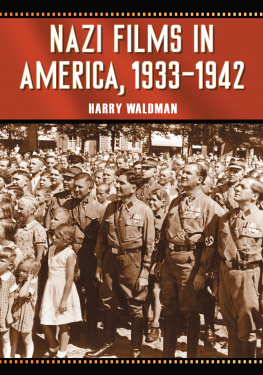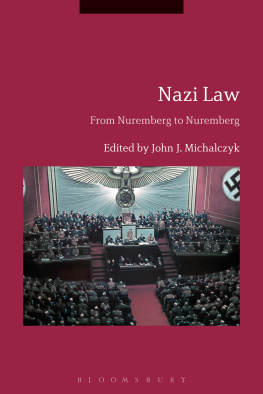NAZI GERMANY
AND THE
HUMANITIES
NAZI GERMANY
AND THE
HUMANITIES
How German Academics
Embraced Nazism
WOLFGANG BIALAS AND
ANSON RABINBACH

A Oneworld Book
This ebook edition published by Oneworld Publications, 2014
First published by Oneworld Publications 2007
This edition published by Oneworld Publications 2014
Copyright Anson Rabinbach & Wolfgang Bialas 2007
The moral right of Anson Rabinbach & Wolfgang Bialas to be identified as
the Authors of this work has been asserted by them in accordance with the
Copyright, Designs, and Patents Act 1988
All rights reserved
Copyright under Berne Convention
A CIP record for this title is available from the British Library
ISBN 978-1-78074-434-6
eISBN 978-1-78074-616-6
Oneworld Publications
10 Bloomsbury Street
London WC1B 3SR
England
Stay up to date with the latest books,
special offers, and exclusive content from
Oneworld with our monthly newsletter
Sign up on our website
www.oneworld-publications.com
CONTENTS
Georg Bollenbeck
Steven P. Remy
Ehrhard Bahr
Dieter Thom
Richard Wolin
Martin Schwab
Karl-Siegbert Rehberg
Willi Oberkrome
Jane O. Newman
Suzanne Marchand
Volker Losemann
Frank-Rutger Hausmann
Susannah Heschel
Alan E. Steinweis
ACKNOWLEDGEMENTS
This book is the result of two conferences held at the University of California, Irvine (910 November 2001) and at Princeton University (45 April 2003). The editors are indebted to the German Academic Exchange Services (D.A.A.D.) for their generous support. At the University of California, Irvine we would like to thank: the School of the Humanities, University of California Humanities Research Institute, the Humanities Center, the Critical Theory Institute, the Department of Philosophy, and the German Department. At Princeton we are thankful for the support of the Council of the Humanities, the Program in European Cultural Studies, the Department of History, and the Shelby Cullom Davis Center. We are especially grateful to Lilian Friedberg and Peggy Reilly for their editorial assistance.
INTRODUCTION: THE HUMANITIES IN NAZI GERMANY
Wolfgang Bialas and Anson Rabinbach
1. German Mandarins and the Third Reich
In his classic study, The Decline of the German Mandarins, Fritz Ringer held the German academic community accountable for having helped undermine the Weimar Republic: they willfully cultivated an atmosphere, he wrote, in which any national movement could claim to be the spiritual revival.
These questions have lost none of their actuality more than half a century after the defeat of National Socialism. During the 1980s and 1990s, public scandals erupted over the political complicity of master
These works offer a more comprehensive and detailed picture of the complex ways in which scholars in a variety of disciplines were able to advance their careers during the Third Reich by lending their skills and professional expertise to well-funded national research communities, to the wartime mobilization of the humanities, and, to a somewhat lesser extent, to party organizations like Himmlers Ahnenerbe and Alfred Rosenbergs ideological empire. It is our hope that this volume will provide, if not a complete overview, a survey of the situation of the humanities by focusing on key disciplines and approaches in order to illuminate the broader historical context of these high-profile cases occurred.
2. The Nationalization of the Academics
In 1933, scholars of Jewish descent, and to a lesser degree political opponents of the Nazis, suffered an unprecedented loss of positions and livelihood at Germanys universities. Of the seventeen hundred faculty members and 313 full professors (Ordinarius) who lost their jobs, eighty per cent were removed on racial grounds. The rest were pacifists or had left-wing sympathies.
The philosopher Helmuth Plessner, who took refuge in The Netherlands in 1934, attempted to explain the unabashed enthusiasm of his colleagues in terms of the sense of crisis produced by an almost universally felt discrepancy between the quasi-messianic idea of Germanys world historical mission and its post-1918 plunge into insignificance as a world power.
Nevertheless, much of the recent scholarship on the humanities in Nazi Germany has not sustained Plessners overarching explanation: no single rationale can be ascribed to all of these early (or later) academic converts to National Socialism. The broad support National Socialism garnered from the established representatives of the While only a few scholars built new careers in the party bureaucracies and organizations, most subscribed to vaguely national, vlkisch, or racial doctrines well before 1933. Not surprisingly, many retained the illusion of intellectual independence, and only a tiny minority withheld participation. Prominent figures like Schmitt, Heidegger, and Arnold Gehlen (see Karl Siegbert Rehbergs essay) saw Hitlers ascent as a unique opportunity to turn their convictions into political ends, to achieve the absolute clarity of a political decision in the face of a plurality of opinions, or to take the larger step to activism. For these academic giants, the chance to exert an influence on academic politics and perhaps even on key aspects of society, the opportunity that had been denied to them in the era of the system (System-Zeit), proved impossible to pass up. For the vast majority, however, the higher purpose of maintaining a certain intellectual niveau in the turbulent moment of political change was, at the very minimum, a justification to offer their services to the new regime in good faith. It is also apparent that those scholars drawn to the S.S. and the party organizations (like the historian Kleo Pleyer, discussed by Willi Oberkrome) were younger, more zealous, and more ideologically committed to the new order.
The vow of allegiance to Adolf Hitler published by the Saxon branch of the National Socialist Teachers Association in November 1933 proudly contained an appeal to the intelligentsia of the world accompanied by statements in four languages by distinguished The vow of allegiance clearly articulated the political expectations the National Socialist state placed on these self-proclaimed apolitical scholars. Shrouded in the appearance of an uncoerced and freely undertaken oath, the public display of allegiance to the new order was all the more valuable, as a contemporary photograph of the professorate surrounded by flag-bearing Brownshirts demonstrated. Rhetorically staged as a public decision of conscience for the National Socialist revolution, the vow could be seen as a collective statement, directed at the academic profession as a whole, not of politicized scholarship endangered by National Socialism but of an expressly guaranteed autonomy, indeed, ironically, of freedom of scholarship.
Such public gestures of enthusiasm for Hitler ironically permitted some scholars to combine public display with private reservations. An insight into the private thoughts of one noted literary scholar, and perhaps of numerous colleagues in other disciplines at the same moment, is evident from a letter written by Karl Vitor to the philosopher and Rector of the University of Bonn, Erich Rothacker, in July 1933, in which he avowed that there can be no question of a party-oriented coordination











